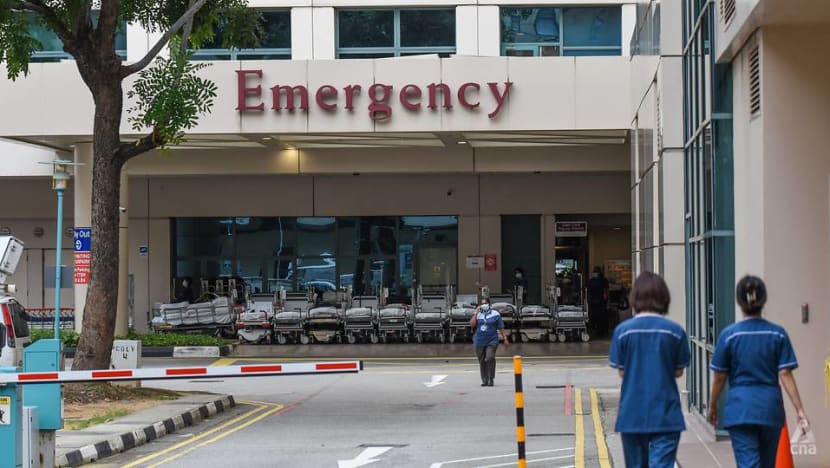‘Several important lessons’ from Tan Tock Seng Hospital COVID-19 cluster, says Gan Kim Yong

Hospital staff members walking towards Tan Tock Seng Hospital's Accident and Emergency (A&E) department on Apr 30, 2021. (Photo: Calvin Oh)
SINGAPORE: Singapore has learnt "several important lessons" from the COVID-19 cluster at Tan Tock Seng Hospital (TTSH), among them - that the B16172 strain “appears very infectious” and vaccines are “not a guarantee” against infection, said Minister for Health Gan Kim Yong on Tuesday (May 11).
The B16172 variant of the coronavirus was first detected in India.
Singapore authorities said earlier this month that five cases in the TTSH cluster have the B16172 variant.
READ: Virus variants from India 'concerning' as infections could spread 'quickly and widely': Gan Kim Yong
READ: 5 COVID-19 cases in Tan Tock Seng Hospital cluster have Indian variant of coronavirus
Giving an update on the TTSH cluster and the lessons learnt, Mr Gan said in a ministerial statement in Parliament: "This particular B16172 strain appears very infectious, and there will be other variants just like it.
“While vaccine breakthroughs are possible, vaccines can help to prevent severe illnesses. Vaccines can also reduce risk of further transmission, although the extent of which this is true is still being investigated."
He added: “It is clear that vaccination is most effective when it is part of a whole suite of precautionary measures, such as mask wearing, safe-distancing, accurate testing, thorough contact tracing and timely isolation.”
READ: Tighter COVID-19 measures important as Singapore is on knife-edge: Lawrence Wong
CONTAINMENT MEASURES
The first case detected in the TTSH cluster was a nurse who worked in Ward 9D. She developed symptoms of acute respiratory infection on Apr 28 and tested positive for COVID-19 on the same day.
“She dutifully reported her symptoms and she was immediately tested. And despite the fact that she had completed her vaccination earlier in the year, she was confirmed to be COVID-positive,” Mr Gan said.
“I should point out that this does not mean that she is the first infected case, and had brought COVID-19 into the wards. Investigation is still ongoing. But her responsible act enabled us to pick up the cluster at Tan Tock Seng Hospital.”
READ: A timeline of the Tan Tock Seng Hospital COVID-19 cluster
The COVID-19 task force “immediately threw a containment ring” around the first detected case, quarantining close contacts and testing everyone who could have been in contact with her, said the Health Minister.
He added that the immediate priority in such situations is to contain and isolate the infections so that they do not spread to the larger community.
“This included all staff and patients of the affected Ward 9D. By the next day on Apr 29, we had identified three staff and six patients of Ward 9D who were infected,” said Mr Gan.
One of these patients started to display symptoms. As he had entered Ward 9D earlier on Apr 20, Mr Gan noted that testing and quarantine were extended to all staff members who worked in Ward 9D, as well as discharged and current inpatients and visitors to the ward from Apr 20.
All inpatients and employees working in the main ward block were also tested for COVID-19, added Mr Gan.
After this round of testing, all other hospital staff were also screened, and patients and staff from the main ward block were tested for infection again for “additional precaution”.
“We then threw a larger ring around Tan Tock Seng Hospital, inviting discharged patients and visitors who were in the hospital during the affected period to also be tested. They are not close contacts and hence have a lower risk of infection, but we offer to test them for abundance of caution and to give them peace of mind,” said Mr Gan.
“For every case detected, a large ring was drawn around them for testing and isolation, and we locked down all wards that had exposure to infectious cases.”
As of May 10, close to 2,500 people have been quarantined. A total of 12,500 people have been tested as part of the special testing operations, said Mr Gan.
This is on top of 12,000 staff members, 1,000 patients, as well as those under quarantine.
There are a total of 43 COVID-19 cases in the hospital cluster - 10 staff members, 26 patients and seven visitors or household members, he added.
“We will continue to monitor the individuals who have been exposed, and retest them where necessary as some of them may be incubating the infection.”
VACCINATION PROVIDES "CRITICAL PROTECTION"
Of the 43 cases in the cluster, seven staff members and two patients had received full doses of the COVID-19 vaccine, said the Health Minister. “They were all either asymptomatic, or only exhibited mild symptoms, and none of them required oxygen support.”
Among the 34 who were not fully vaccinated, six needed oxygen support, two are in intensive care, and one died from COVID-19 complications, he added.
“While the numbers are too small to draw firm conclusions, the findings do indicate that vaccination provides critical protection even against COVID-19 variants,” said Mr Gan.
“We know that while vaccination does not eliminate the risks of infection completely, it does provide significant protection against infection and help to reduce the severity of the disease. It is also likely to reduce onward transmission.
“I therefore urge everyone to get vaccinated when it is offered to you, and continue to comply with safe management measures even if you have been vaccinated. This will help to keep all of us safe.”
To prevent further spread of COVID-19 in the hospital, TTSH has locked down affected wards, stopped all new admissions to the hospital, restricted visitors and reinforced infection control, hand hygiene and PPE compliance for all staff, noted Mr Gan.
“Even while we were dealing with the cluster, work was also ongoing to understand the source and course of the infection. Investigation is still ongoing and more will be shared when it is ready.”
Watch his full ministerial statement:
BOOKMARK THIS: Our comprehensive coverage of the coronavirus outbreak and its developments
Download our app or subscribe to our Telegram channel for the latest updates on the coronavirus outbreak: https://cna.asia/telegram












